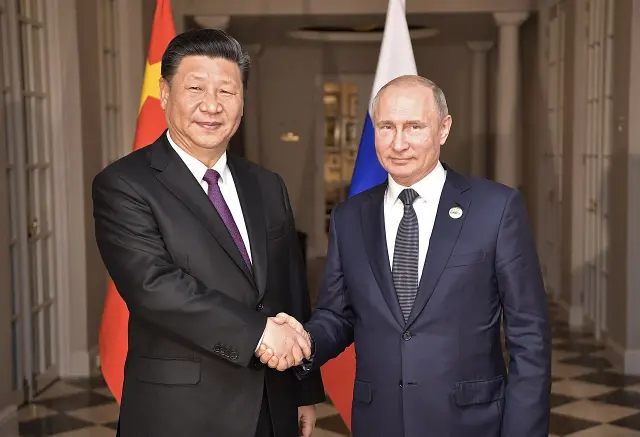Chinese leader Xi Jinping welcomed Russian President Vladimir Putin to China on Thursday, marking the Russian president’s second visit within a year. This event underscores their deepening alliance amid increasingly stark global divisions, as conflict ravages Gaza and Russia advances in Ukraine.
Putin and Xi have often emphasized the strength and depth of their “no limits” partnership, which signifies a comprehensive and strategic alignment between Russia and China. This term underscores their commitment to close cooperation across various sectors, including economic, military, and diplomatic realms.
Emboldened by advances in his war against Ukraine, Putin wants a deal for the Power of Siberia 2 natural gas pipeline, further Chinese support for the war, and access to Chinese financial markets and use of Chinese currency.
Xi is fresh off his visit to Europe, where Serbia and Hungary rolled out the red carpet for him. Unlike an isolated Russia, China is still viewed by the West as an important international player. Xi wants to preserve its trade and military relations with Russia.
Putin’s arrival in China follows closely on the heels of his recent re-election, extending his autocratic reign until 2030—a result of an election devoid of genuine opposition. Scheduled for May 16-17, as reported by Chinese state media, this visit mirrors Xi’s own state visit to Moscow over a year ago. Both leaders have defied norms by extending their terms in office, illustrating a convergence in their political trajectories.
Their meeting is set against the backdrop of the impending American presidential elections and growing international criticism of Washington’s support for Israel’s war on Gaza. This summit will likely serve as a platform for Xi and Putin to strategize on how to further their mutual goal of diminishing American influence on the global stage.
Moreover, this visit takes place within a broader context of a burgeoning but loosely coordinated alignment among anti-American states, including Iran and North Korea. Pyongyang, heavily reliant on China, is suspected by Western governments of supplying Russia with wartime materials. Similarly, Tehran, bolstered by economic support from Russia and China, remains a significant player in the Middle Eastern conflict, with the US alleging its involvement in aiding Russia.
Putin arrives emboldened by the resilience of Russia’s wartime economy and a significant new offensive along key Ukrainian front lines. For Xi, returning from a European tour, the visit is a chance to demonstrate that his support for Putin does not preclude engagement with Western nations.
In a pre-visit interview with Chinese state news agency Xinhua, Putin extolled the “great prospects” of their partnership, emphasizing joint efforts to “strengthen the sovereignty, protect the territorial integrity, and ensure the security of our countries.” He highlighted plans to deepen cooperation in high-tech industries, space exploration, nuclear energy, artificial intelligence, renewable energy, and other innovative sectors.
However, the display of solidarity masks underlying complexities. Beijing faces mounting pressure from Washington over support for Russia’s defense industry. In Europe, Xi encountered significant tensions, finding a warm reception only in Serbia and Hungary, while China’s principal ally, Russia, remains internationally isolated.
Xi has intensified calls for Europe and other nations to avoid a “Cold War” mentality and resist what Beijing perceives as US efforts to contain China. Yet, even as he hosts Putin this week, Xi’s actions are perceived as reinforcing a growing global schism, potentially exacerbating divisions with the West. This poses a challenge, as experts suggest China still relies on Western technology and investment to sustain its economic and technological advancements.
Russia is fundamental to China’s grand strategy. Beijing might not desire an escalation, but it is deeply interested in ensuring that Russia doesn’t lose the war.
The deepening alliance between Xi and Putin should be concerning for those in the West who value democratic values and a stable world order. Both countries do not respect human rights, and both are willing to invade foreign territories to expand their own borders.
In terms of trade and security, both countries pose a threat to the West, and these are serious issues that need to be addressed.
This two-day visit will surely result in some important decisions for both countries and the West will be prudent to keep an eye on what is taking place there.
